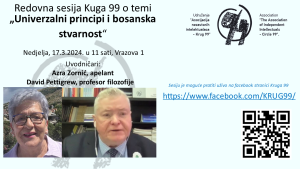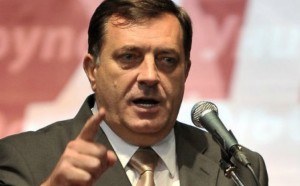EUROPE ABANDONED FUNDAMENTAL LEGAL PRINCIPLES IN BOSNIA-HERZEGOVINA

| 13 June 2022 – 9 EUROPE ABANDONED FUNDAMENTAL LEGAL PRINCIPLES IN BOSNIA-HERZEGOVINA There is a long list of reversals and violations of fundamental legal principles in Bosnia-Herzegovina, promoted and implemented primarily by representatives of the European Union (previously, the European Community). This list starts with the reversal of the principle of sovereignty, comitted by the official representatives of the then European Community, Lord Carrington and Jose Cutileiro, at the Lisbon Conference organized by the European Community in February 1992. One of the basic postulates of both political theory and constitutional law, saying that sovereignty of the state is indivisible and non-transferable, was turned upside-down by Carrington and Cutileiro, who divided Bosnia-Herzegovina's sovereignty and its territory into three separate, ethnically determined parts, and then transferred these parts to the self-proclaimed leaders of Bosnia-Herzegovina's three major ethnic groups (Alija Izetbegović, Radovan Karadžić, Mate Boban). Ethnic cleansing and genocide that followed in the period 1992-1995 were a direct consequence of the Carrington-Cutileiro's reversal of the postulate of sovereignty's indivisibility and non-transferability: in order to create three quasi-sovereign mono-ethnic territories out of the single multi-ethnic territory of the sovereign state of Bosnia-Herzegovina, it was necessary to cleanse these three territories from members of other ethnic groups. As this goal could only be achieved by means of mass-violence, the war and genocide that followed from 1992 to 1995 were, in fact, a direct implementation of the Carrington-Cutileiro Plan, a plan from which the European Community, and then the European Union, has never distanced itself. To the present day, the European Union's officials have failed to recognize the sovereignty of Bosnia-Herzegovina and its institutions, continuously insisting on the pattern of communication and negotiation exclusively with the three self-appointed ethnic leaders, who are being treated as three quasi-sovereign tribal chiefs (nowadays, these are Bakir Izetbegović, Milorad Dodik, and Dragan Čović). In this way, the European Union's officals have practically transformed the constitutional structure of the sovereign state of Bosnia-Herzegovina into that of a union of tribal communities. The Dayton Peace Accords, which ended the war in November 1995, attempted to restore Bosnia-Herzegovina's sovereignty. However, the state's internal sovereignty has never been fully restored, given the fact that these ‘entities’ have been granted arbitrary veto power (the so-called ‘entity voting’) in the state Parliament's lower house, the House of Representatives. Also, in the Parliament's upper house, the House of Peoples, the three major ethnic groups have also been granted arbitrary veto power. Given this double veto key, the state sovereignty has remained drastically reduced, if not practically abolished. As a compensation for that curtailment, the Dayton Peace Accords in its Annex 10 introduced the institution of the High Representative, with legal rights to overpower blockades that can be caused by vetos in both Houses. To further strengthen the state sovereignty, the Dayton Peace Accords in its Annex 9 introduced the institution of state-owned corporations. To reverse some of the consequences of ethnic cleansing and restore the property relations disrupted by the war, the Dayton Peace Accords in its Annex 7 introduced the obligations of return of the refugees and restoration of their property seized by the occupying forces. However, from 1995 to the present day, neither the provisions of Annex 7 nor those of Annex 9 have been implemented. The current situation in Bosnia-Herzegovina, in which the state property is being claimed by the entities, while a major part of the refugees’ private property is still being held by those who seized it during the war and afterwards, is to a greatest extent a consequence of the grave violations of the Dayton Peace Accords through non-implementation of its Annex 7 and Annex 9. The Peace Implementation Council, a body formally superior to the High Representative, has also entered the process of violation of the Dayton Peace Accords by proposing the option of abolishment of the institution of the High Representative under the extra-Dayton conditions labelled as ‘5+2’. Thus one of the basic legal principles has also been violated: no contract can remain valid if you annihilate or exclude any of its parts. For, abolishment of the High Representative, as the central part of Annex 10, leads to abolishment of the entire Annex 10 and therefore of the entire Dayton Peace Accords. Having failed to insist on implementation of Annex 9 and creation of state-owned corporations, now the European Union, through the High Representative, insist on ‘apportionment’ of the state property (lands, rivers, forests), although the Parliament of Bosnia-Herzegovina has never reached a decision to distribute or apportion any part of the state property. Through this legal fraud, sovereignty of Bosnia-Herzegovina is being dissolved and transformed into sovereignty of the entities. Bosnia-Herzegovina is no ‘special case’ and does need only a restoration and application of fundamental legal principles and postulates, applied to the rest of Europe. Bosnia-Herzegovina needs a constitution based on civic, liberal-democratic principles, a constitution that may well be a replica of any existing European constitution. Summary of Session of 12 June 2022 The presenter at this session was Dr. Zlatko Hadžidedić, Center for the Study of Nationalism, Sarajevo Adil Kulenović, President |
| Association of Independent Intellectuals – Circle 99 (Bosnian: Krug 99), a leading Bosnian think-tank, was established in Sarajevo in 1993, in the midst of the Bosnian war (1992-1995), while the capital was under siege. Circle 99 provides a platform to bring together intellectuals of various professional and ethnic identities; university professors, members of the Academy of Sciences and Arts of Bosnia and Herzegovina, artists, journalists, entrepreneurs, diplomats, and other prominent figures from Bosnia and from abroad. Multidisciplinary discussions and initiatives are held each Sunday throughout the academic year, in the form of regular sessions about politics, science, education, culture, economy, and other societal issues. The overall goal is to sensitize the public towards a democratic transformation, achieving and maintaining peace, and integration of modern Bosnia into the community of countries fostering liberal democracy. Circle 99 has been declared an organization of special significance for the city of Sarajevo. |







